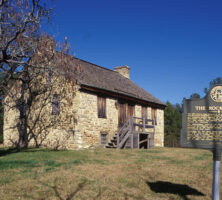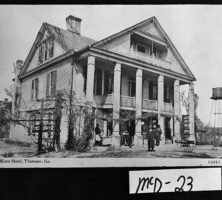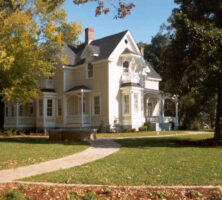Thomson, the seat of McDuffie County, lies thirty miles west of Augusta along the east-west corridors of Interstate 20 and U.S. 278. Thomson was named for J. Edgar Thomson of Philadelphia, Pennsylvania, the chief civil engineer and surveyor of the Georgia Railroad, which ran from Augusta to Crawfordville.
Thomson was incorporated in Columbia County by the state legislature on February 15, 1854. When McDuffie County was created from parts of Columbia and Warren counties in 1870, Thomson, near the center of the new county, was designated its county seat.

Thomson grew with the railroad. The wooden station gave way to the 1860 granite depot, later augmented with brick. John Langston, a farmer who owned much of the land that made up Thomson, converted his house to a hotel serving railroad crew and travelers. Langston’s son-in-law, the Reverend J. H. Stockton, bought land south of the railroad, dividing it into building lots. Around 1850 he, too, built a hotel, the Knox Hotel, which still stands. Stockton was also instrumental in the development of Thomson’s schools and churches. Merchants settled into stores mostly facing the railroad. Fires in 1886 and 1888 changed the face of the town. The Thomson Telephone Exchange was chartered in 1901, the Thomson Light and Water Company in 1918. In more recent times, Interstate 20 and the Thomson-McDuffie Regional Airport have influenced the city’s development.
Gold was discovered near Thomson in 1823. Most of this gold, totaling $80,000 in bullion, was obtained close to the earth’s surface and refined by the use of a stamp mill, constructed by the local mine owner Jeremiah Griffin. After the Civil War (1861-65) gold mining declined. Today Thomson’s industries include kaolin mining, textile manufacturing, iron works distribution facilities, and agribusiness. Several large industrial parks surround the city.
According to the 2020 U.S. census, Thomson’s population was 6,814. Thomson is known as the “Camellia City of the South” and also as the “Tournament City.” Proximity to Augusta and to Aiken, South Carolina, with their rich golfing and equestrian histories, and to the Strom Thurmond/Clarks Hill reservoir, has encouraged a variety of competitive recreational activities. Augusta’s Masters Tournament has encouraged the development of more than twenty area golf courses. Baseball, softball, and fishing tournaments are held in Thomson, as well as archery tournaments like the Dixie Bowhunter Jamboree. The Belle Meade Hunt, one of the few fox hunts in the Southeast, begins with the “blessing of the hounds” in early November, and hunts take place each week through March. Pine Top Farm, known for its equestrian events, served as a training site for Olympic competitors from five countries before the 1996 Olympic Games in Atlanta.

Among the points of interest is one of the few monuments dedicated to the women of the Confederacy, which is located at 111 Railroad Street. Another is the 1785 Rock House, Georgia’s oldest stone house, which is listed on the National Register of Historic Places.
Augusta Techncial College operates a satellite campus in town.
Thomson was the hometown of statesman and politician Thomas E. Watson, a prominent member of the Populist Party in Georgia and the namesake of the Watson-Brown Foundation. Other Thomson natives include the blues musician “Blind Willie” McTell and the folk artists Jake McCord and Zebedee Armstrong.











